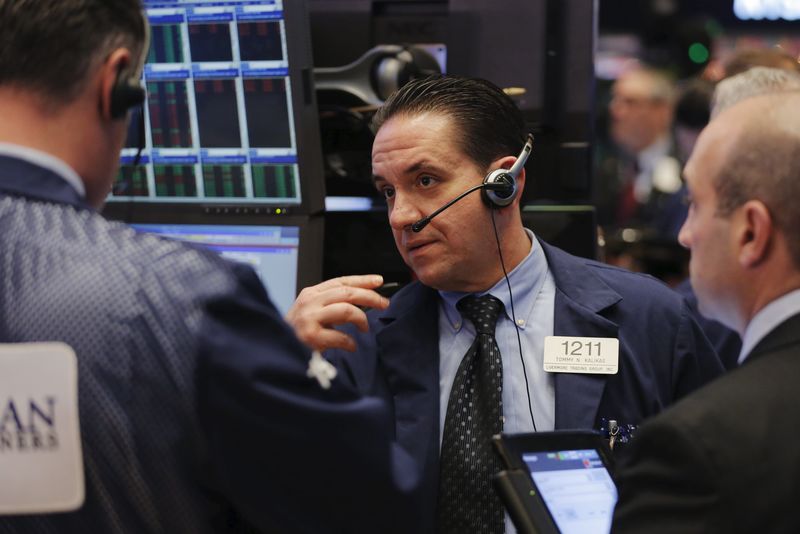By Sinead Carew
NEW YORK (Reuters) - A persisting world oil glut dragged Brent crude prices down on Monday to their weakest in more than 11 years and U.S. crude to six-year lows, but Wall Street gained broadly after big declines a week earlier.
The dollar fell against the euro and yen as data from the Chicago Federal Reserve suggested the U.S. economy grew at a below-average pace in November, before the Federal Reserve raised interest rates last week.
Wall Street started the abbreviated Christmas holiday week on a positive note, led by tech and financials, and even the S&P 500 energy sector rose despite oil's tumble. (N)
Equity markets in Europe and Asia were largely higher. The MSCI all-world stock index was up 0.3 percent, erasing some of its Friday losses.
"There looks to be like a little relief bounce this morning as we move into the last two weeks of the year," said Andre Bakhos, managing director at Janlyn Capital LLC in Bernardsville, New Jersey. "It's a fickle market."
The Dow Jones industrial average was up 119.46 points, or 0.7 percent, to 17,248.01, while the S&P 500 gained 15.29 points, or 0.76 percent, to 2,020.84 and the Nasdaq Composite was 40.49 points, or 0.82 percent higher at 4,963.57.
The Dow ended Friday down 2.1 percent, while the S&P 500 lost 1.78 percent and the Nasdaq 1.59 percent. All three fell on the week.
Brent futures recovered some ground and was down nearly 1.8 percent at $36.22 after falling as much as 2.3 percent to $36.04 a barrel earlier, the contract's lowest level since July 2, 2004. U.S. crude fell to $33.98, its lowest level since Feb. 13 2009. [O/R]
SPAIN VOTE
While Europe's index of major companies rose slightly, Spain's Ibex share index fell 2.2 percent and was on track for its worst day in almost three months after a fragmented national election.
In Spain, Prime Minister Mariano Rajoy's conservative Popular Party won more seats than any other party but fell well short of a majority. Left-wing parties also failed to win a clear mandate to govern, and talks to form a coalition government could drag on for weeks.
Germany's DAX rose 0.6 percent, Britain's FTSE 100 gained 0.9 percent and France's CAC40 index was up 0.5 percent.
U.S. Treasury yields were little changed on Monday on hesitation to make major bets in thin year-end trading conditions, while little focus on the Federal Reserve's next rate hike also kept trading activity muted.
Benchmark 10-year U.S. Treasury notes were last mostly flat in price to yield 2.195 percent, from a yield of 2.197 percent late Friday. U.S. 30-year Treasury bonds were last down 2/32 in price to yield 2.911 percent, from a yield of 2.908 percent late Friday.
In currencies, the dollar fell 0.27 percent against a basket of major currencies, and the euro =EUR rose 0.4 percent against the dollar.
China's yuan was fixed higher for the first time in 11 sessions. Beijing will keep monetary and fiscal policies accommodative in 2016 to help support the slowing economy, a source with the direct knowledge of the annual Central Economic Work Conference said on Monday.
Earlier in Asia, MSCI's broadest index of Asia-Pacific shares outside Japan rose 0.4 percent, as investors bid up modestly priced Chinese blue chips. China's Shanghai Shenzhen CSI 300 index surged 2.6 percent, but Japan's Nikkei 225 fell 0.4 percent.

Gold rebounded after last week's slide following the first U.S. interest rate hike since 2006. It was up 1.3 percent at $1,078.96 an ounce.